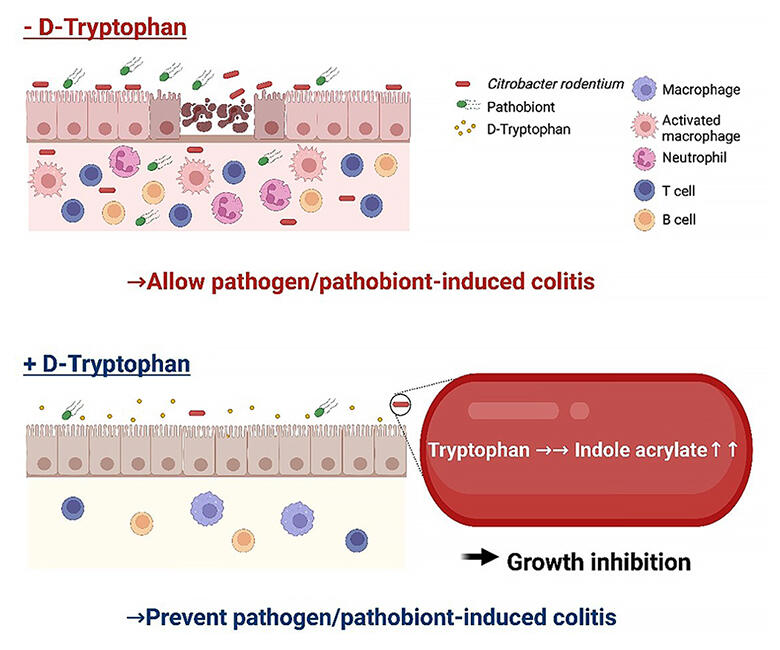A research group led by Keio University and Meiji Holdings has discovered that D-Tryptophan (D-Trp), a D-amino acid, inhibits the growth of pathogenic bacteria and pathogenic symbiotic microorganisms in the intestines and prevents colitis (inflammation of the colon).

The absence of or low in D-Trp in the intestine allows pathogen invasion and virulence manifestation of pathobionts, which induce accumulation of inflammatory immune cells. On the other hand, the presence of or high in D-Trp in the intestine inhibits the growth of gut pathogen and pathobionts, thereby suppressing the onset of colitis. The inhibition of the growth of pathogenic bacteria by D-Trp is related to changes in intracellular tryptophan metabolism, in which indole acrylate acid in the bacteria is increased.
L-amino acids are essential to all life because they function as the building blocks of proteins, but in contrast, the function of D-amino acids, the mirror-image isomers of L-amino acids, has long been unknown. However, it is now clear that D-amino acids also exist in vivo and that they play important roles in the physiological functions of mammals and microorganisms. D-amino acids are produced primarily by bacteria, but also by intestinal bacteria, and are known to function as potent bactericidal molecules.
The research group hypothesized that D-amino acids may play a role in maintaining a healthy intestinal environment by directly acting on enteropathogenic bacteria (harmful bacteria in the intestine) and conducted research to clarify that D-Trp suppresses the growth of enteropathogenic bacteria and prevents colitis.
In an in vitro comparison of the inhibitory effects of various D-amino acids on the growth of enteropathogenic bacteria, the addition of D-Methionine (D--Met) and D-Trp was found to inhibit the growth of C. rodentium intestinal pathogen in mice and prevented fatal intestinal infections.
The research group also examined whether D-Trp suppresses enterocolitis caused by intestinal bacteria. When the mice were treated with dextran sodium sulfate (DSS), which induces intestinal bacteria-dependent enterocolitis, the mice treated with D-Trp had little weight loss and no colitis even when they drank DSS. From this, it was clarified that D-Trp also has a protective effect against colitis caused by intestinal bacteria.
In further examining how D-Trp affects bacterial metabolism, the research group found that indole acrylic acid, which increases in bacteria upon D-Trp administration, inhibits the growth of enteropathogenic bacteria.
According to Professor Yun-Gi Kim of the Faculty of Pharmacy, Keio University, "We expect that D-Trp will not only be developed as a new functional material to improve the intestinal environment, but that it will also be applied to the prevention and treatment of intestinal inflammation, such as infections and inflammatory bowel disease that are caused by enteropathogenic bacteria."
■ Pathogenic symbiotic microorganisms: Of the bacteria that live symbiotically with their host, these can have an adverse effect on the host only under certain environmental circumstances.
Journal Information
Publication: iScience
Title: D-Tryptophan suppresses enteric pathogen and pathobionts and prevents colitis by modulating microbial tryptophan metabolism
DOI: 10.1016/j.isci.2022.104838
This article has been translated by JST with permission from The Science News Ltd.(https://sci-news.co.jp/). Unauthorized reproduction of the article and photographs is prohibited.




